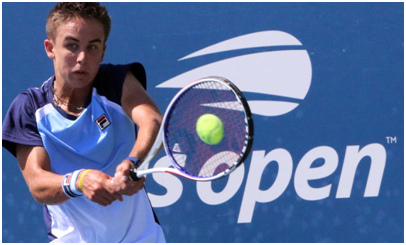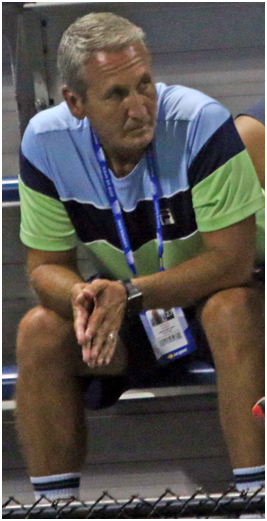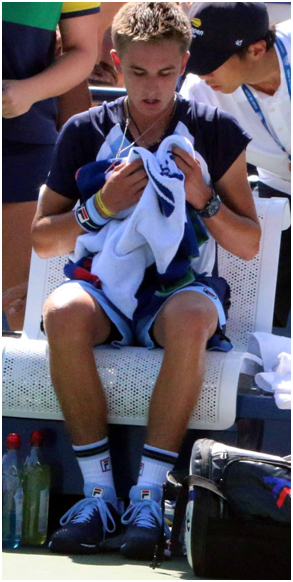VIEW AND DOWNLOAD WORLD TENNIS GAZETTE VOL. 12 NO. 5
By JOHN MARTIN

World Tennis Gazette/John Martin
NEW YORK —Until the last minute, it looked like Zachary Svadja, who stands 5 feet 9 inches, would face Kevin Anderson, who stands 6 feet 8 inches, in the first round of this year’s U.S. Open.
That was the way the main draw lined up. Then it changed. Anderson withdrew with an injury and Paolo Lorenzi, a lucky loser from the qualifying tournament was inserted in his place.
Lorenzi didn’t know how lucky he was.
Svajda took a commanding two-sets-to-none lead, then found his body cramping so badly he could barely hold his racket.
“Until full-body cramps overtook him early in the third set against the veteran Paolo Lorenzi, he (Svajda) was the better player,” wrote David Waldstein of The New York Times.
Lorenzi won in five agonizing sets but Svajda had struck a chord with Waldstein and an adoring crowd that swamped Court 5 on opening day.
They cheered, they applauded, they swarmed seating on adjacent Court 6 to lean over and shout encouragement.
“Many times the fans chanted his last name — which is pronounced SVAI-da — and also chanted, “Let’s go Zach,” said Waldstein of The Times.
When asked after the match about the tumult and fanfare, Svajda said: “I’ve never experienced any of that.”
Had it distracted him? “I loved it,” he said with a grin.
The fanfare for mid-teen Zach may be new but the astonishment about his mature strokes and modest demeanor has existed for a dozen years or more.
It started when his father persuaded a professional tour coach to watch 3-year-old Zach hit balls for 30 minutes.

World Tennis Gazette/John Martin
Matt Hanlin, the tour coach, was so impressed he signed on to help Tom Svajda, Zack’s father (and a club teaching pro), help develop Zach’s skills.
Based at the Pacific Beach Tennis Club, a small, eight-court public facility established in 1962 in the blue-collar suburb of Pacific Beach, Zach grew up out of the limelight that often shines on junior tennis stars bred in the wealthy adjacent suburb of La Jolla.
More than 50 years earlier, Karen Hantze, another player to hail from Pacific Beach, emerged as a young junior competing against her rival, Billie Jean Moffitt of Long Beach.
In 1962, Karen Hantze Susman won the Wimbledon Singles and Doubles Championships. Her doubles partner: Billie Jean Moffitt King.
Now in the 21st Century, Zach’s performance has begun to raise expectations in a new way. Unlike Hantze Susman, his 20th Century predecessor in the spotlight, Svajda,16, has played junior tournament tennis only sparingly.
The result is an unusual career path that has created opportunities rarely enjoyed by players his age.
Svajda turned professional early this year, playing Challengers and Futures and moving to Texas where he began training with John Isner. In March, he accepted an invitation to serve as Roger Federer’s hitting partner at the Indian Wells tournament.
“That was awesome,” Svajda said. “I was pretty nervous in the beginning. Then after, I was just used to it because I practice with some of the pros.”
In mid-year, he accepted his father’s suggestion that he enter the hallowed USTA National Junior 18 Championship in Kalamazoo, MI. There, he upset the top seed in the semifinals and the fifth seed in a final that gained him a wild card entry directly into the US Open men’s draw.
How important was his decision to skip junior play? In a New York Times interview, his tour coach Hamlin said the defensive style many juniors favor, with its baseline-hugging rallies, “would not help Svajda’s game,” The Times reported.
“He can hit out and play big,” Hanlin said. “The only thing I can’t do anything about is his size. He’s still got a 16-year-old’s body. But as soon as his legs are up to par with these other guys, he can do some great things out here.”
But not every match follows the desired script. Days after his impressive loss in the US Open men’s singles, Svajda lost to an 18-year-old junior from the Czech Republic in the US Open junior singles. For his fans, It was a sobering, surprise comedown.

World Tennis Gazette/John Martin
One irony of the loss was that Zach’s family roots are also in the Czech Republic. But there was a deeper distraction: Did losing in straights to another junior in the opening round of the US Open Junior Championships suggest that Zach wasn’t up to the test of big-time adult tennis?
Any doubts were dispelled by the United States Tennis Association. Soon after the US Open ended, it offered the Svajda family housing in Orlando, Florida and financial support so Zach could train at the USTA development program on its campus nearby.
And there was the matter of $58,000, the loser’s prize money awarded after the first round at Flushing Meadows.
For Zach, it required a decision. A product of home schooling, did he want to forego high school and college? Did he want to accept the money and fully commit to a professional career on tour at the tender age of 16?
“And pay the taxes,” said his father, smiling.
A decision came quickly, and agents began besieging Zach and his father to sign endorsement contracts. Zach now has deals to allow his name to appear on rackets, clothes, and shoes.
So the future is now. And it looks bright — but complicated.
In October, his mother began preparing to move to the Orlando area near Zach’s USTA training campus. His father remains in Pacific Beach, rising early each morning to open the club and give lessons to his clients.
Zach’s brother, Trevor, 13, continues to train with his father. He, too, shows promise.
Zach has returned to the Futures and Challengers, often winning qualifying matches with ease, then one or more main draw encounters.
As a result, by October, his ranking began to rise, moving from the 1,400s to near 1,000. At a tournament in Fairfield, CA, Svajda took a set off Denis Kudla, who ranked 107.
One drawback: Ceaseless travel. After a recent weekend reunion in Los Angeles, his father observed, “I was with him for 14 hours; next time I see him, will be a month.”
Wherever he is on the road, Zach plans to return to Pacific Beach for at least one day in November. His birthday is the 29th. He will be 17. Prediction: There will be tears — and joy.
Yes, the future is uphill.
But based on his modest demeanor, a winningly cheerful attitude, and his phenomenal work habits, it’s safe to say, “Everybody loves Zach.”